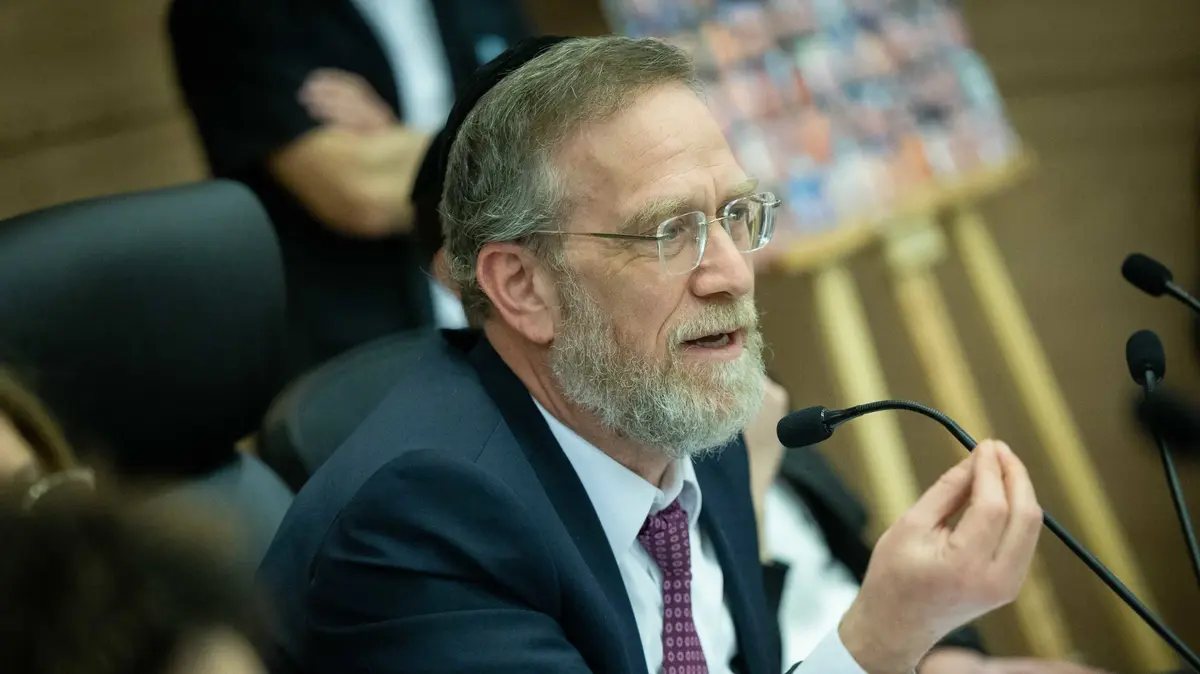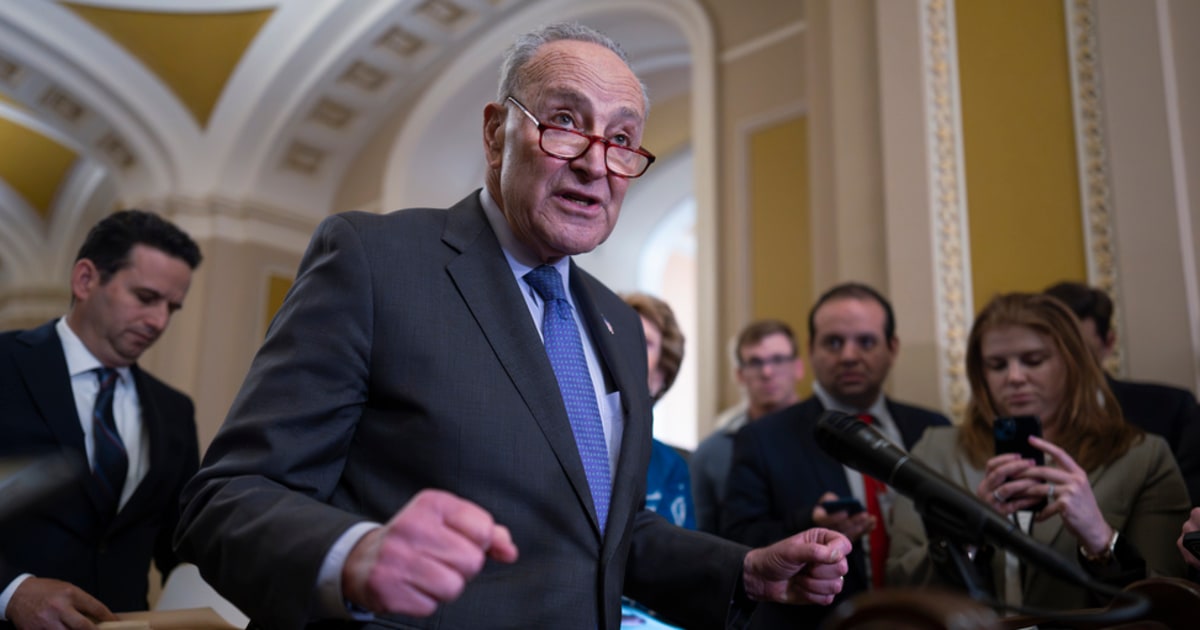By Sahil Kapur and Benjy Sarlin -
NBC News
WASHINGTON — Democrats are trying to reignite important pieces of President Joe Biden's agenda for the return of activity in Congress this week, with big bets to support his legacy, an eye on the 2022 midterm elections and with millions of people looking for financial help.
Before the Senate adjourned, Majority Leader Chuck Schumer, D-N.Y., said discussions about a sequel to the failed
Build Back Better
Act
are
continuing and may "pick up the pace" after of the two-week break.
[Orrin Hatch, Oldest GOP Senator, Dies at 88]
“We want to get it. There are many conversations going on. But they still don't have a great degree of definition,”
he told reporters.
"We would like to move a reconciliation bill and go as far as possible, get as much as we can with 50 votes," he clarified.
Thanks to narrow margins, accusations over the failure of the previous bill and the political vulnerability of some Democrats gearing up for midterm elections in the fall, the new effort faces a series of obstacles.
The Senate is likely to act first, after centrist Joe Manchin, a Democrat from West Virginia, surprised the House by rejecting the bill passed in December.
Here are the main issues facing the new push:
What are they negotiating about?
Manchin has called for a bill with three components: tax reform, prescription drug costs and energy.
Higher corporate and income taxes would produce more revenue, new prescription drug price control rules would save the government money, and both dollars would be split between reducing the deficit and paying bills. an all-inclusive energy plan that supports climate-focused technology and fossil fuels.
[A recording reveals that the Republican leader privately criticized Trump for the assault on Capitol Hill despite defending it in public]
They all come with question marks, and the further Manchin strays from the House bill that passed last year, the more complicated they could get.
Taxes are more complicated, and could run into thorny issues with Sen. Kyrsten Sinema, D-Arizona.
There are also many possible versions of prescription drug reform.
The proposal for the House bill was carefully crafted to placate Sinema and other opponents, some of whom hail from states and districts with strong ties to the pharmaceutical industry.
The US tax system "is not fair": Biden insists on raising taxes on corporations
March 2, 202201:54
On energy, Manchin has said he's starting from scratch, but Democrats continue to assume the rough starting point will be the Build Back Better
initiative's $555 billion climate plan
, which included tax credits to encourage adoption. faster growth of renewable energy, zero-emission vehicles and other green technologies.
If Democrats agree on the above points - a big "yes" - the next question is whether Manchin is willing to contemplate any additional social spending.
[Do you want to decide the future of the United States, including whether immigration reform is finally approved?]
A similar levy as the House Build Back Better
Act
could leave enough to fund one or more programs and still spend an equal amount on deficit reduction.
At what price does Manchin want to reach an agreement?
For Schumer's allies, it all comes down to whether Manchin wants to get to a "yes" after he pulled out of negotiations in December and withdrew any earlier offers he had made.
“In the end, it wasn't any specific provision or set of provisions that scuttled the bill.
What happened is that not all 50 Democratic senators were interested in reaching the agreement
, ”explained Matt House, Schumer's former director of communications.
“For it to be successful this time, that will have to change,” he added.
Even Democrats eager to negotiate with Manchin on his own terms have publicly hoped he would simply write up his preferred bill rather than vaguely refer to a possible framework for a deal.
[The Supreme Court confirms the exclusion of residents of Puerto Rico from Supplemental Social Security]
Manchin's defenders argue that he has been consistent from the start and that his concerns about ensuring long-term funding for new programs were not taken seriously enough by leadership.
This time around, Manchin is seen dictating the terms of any bill from the start, and everyone from the White House to top progressives seem eager to say yes to whatever he offers.
Manchin's decision to walk off the table in December made it clear that he is okay with not having a bill.
The Liberals love it more than him.
Will Sinema create problems?
Perhaps the biggest concern among Democrats eager for a bill is that Manchin and Sinema don't have compatible demands, primarily on revenue.
For Manchin, the priority is to reform the tax code to raise money and reduce the deficit.
In particular, he wants to raise the corporate tax rate from 21% to 25%, raise the top capital gains tax rate from 23.8% to 28%, and close the so-called interest loophole that favors hedge funds and other investors.
[Florida Approves Removal Of Disney's Special Status In Retaliation For Criticism Of Controversial 'Don't Say Gay' Law]
They are all typical positions of the Democrats.
But Sinema is no ordinary democrat: she opposed rate hikes during negotiations, a position she, according to a Sinema adviser, now holds.
These apps can help you control your budget and save on purchases
April 20, 202204:54
Because of their demands, the House of Representatives passed a bill that still managed to raise about $2 trillion, but through other means, such as a new minimum tax on corporations and an additional tax on income over 10 million dollars.
"They're going to have to figure out if any or all of that revenue can stay or if it has to come back to the table," said Ben Ritz, the director of the Center for Financing America's Future at the Institute for Progressive Policy.
If Manchin and Sinema can't agree on $2 trillion in taxes and savings, there might be enough overlapping ideas for a $1 trillion bill that could fund a climate plan and deficit reduction.
[Biden Administration Seeks to Curb Opioid Epidemic by Expanding Access to Treatment]
But if Sinema sticks to her red lines and Manchin decides her specific fiscal ideas are a must, the negotiation could quickly collapse.
Let's say Sinema and Manchin agree.
Will enough Democrats get on board?
A senior Democratic adviser to the House of Representatives believes that Schumer must recognize that he cannot please everyone, and advised him to find out what can win the 50 votes in the caucus and make it his own.
The adviser pointed to a comment by former Senate Democratic leader Harry Reid to Time magazine in a January article, when asked about Schumer: "If you're going to be a good leader, you have to be able to say no."
[Purdue Pharma agrees to pay $6 billion for its role in the opioid epidemic]
Democrats on the moderate side of the party agree that Schumer's role will be key.
“Because of the divergent views in our caucus, this has to be a White House and Senate Majority Leader-driven process to figure out where the perfect Venn diagram overlap is and maximize what our party can do.” ”, opined John LaBombard, a former spokesman for Sinema.
US President Joe Biden leaves the White House in Washington DC on April 21, 2022. Jim Watson / AFP via Getty Images
“I think if there is a will, there is a way to get a package that can get support from Bernie Sanders and Joe Manchin and everyone in between, that would effectively address inflation, rising costs and the cost of life," he added.
On the left flank of the party, progressives have mostly signaled that they are open to a smaller deal, even if it means some painful sacrifices, such as abandoning cherished proposals or even providing a short-term boost to fossil fuels.
But the real test would come only if a deal were announced, and a last-minute revolt by a single senator or five members of the House of Representatives would kill the bill.
[The President and First Lady of the United States earned about $611,000 in 2021, their tax reports show]
Rep. Alexandria Ocasio-Cortez, a Democrat from New York, believes that "it makes sense" to consider a bill with taxes, savings on medicines and funds for the climate emergency.
“I think the really big and key thing that we have to consider is what real financial boosts are we going to be able to provide to working people.
Because people are really feeling the loss of the child tax credit,” he stated.
House moderates are also demanding a full restoration of the state and local tax deduction, which largely benefits well-off taxpayers and may have to go.
But they would be under enormous pressure from the party to back a deal with 50 Senate votes.
Will the electoral calendar spoil it?
Time is short.
There are only 12 legislative weeks on the Senate calendar before the August recess month, which is considered the point of no return given the proximity of the mid-term elections.
And Biden's immediate priorities in Congress are a new aid package for Ukraine and funding to alleviate the crisis caused by the COVID-19 pandemic, according to a White House official.
[New York Lieutenant Governor Brian Benjamin resigns after being arrested for fraud and corruption]
However, to finalize the broader bill before August, a framework agreement may be needed much sooner - perhaps by the end of May - to give lawmakers time to fill in the details, schedule session time and vote on the amendments.
They will give workers aid checks to compensate for inflation in Wisconsin
April 15, 202200:16
Politically vulnerable Democrats are preparing for re-election by testing their messages.
Passing a major bill late in the cycle could make some lawmakers risk averse.
But other party members insist a reconciliation bill would be a net benefit, and many front-line members have expressed keen interest in passing grassroots initiatives such as prescription drug reform to shore up their midterm message.
There was little sign of celebration from members in competitive seats when Manchin left last year.
Sean McElwee, CEO of the liberal firm Data for Progress, believes the political consequences of falling short once again would be dire.
“Failure to pass this bill would further erode our already weak grassroots enthusiasm
and put Democrats in a mess,” he said.







/cloudfront-eu-central-1.images.arcpublishing.com/prisa/VOQEHFVTC5OSYTU5YOO5SYQ5DU.jpg)







